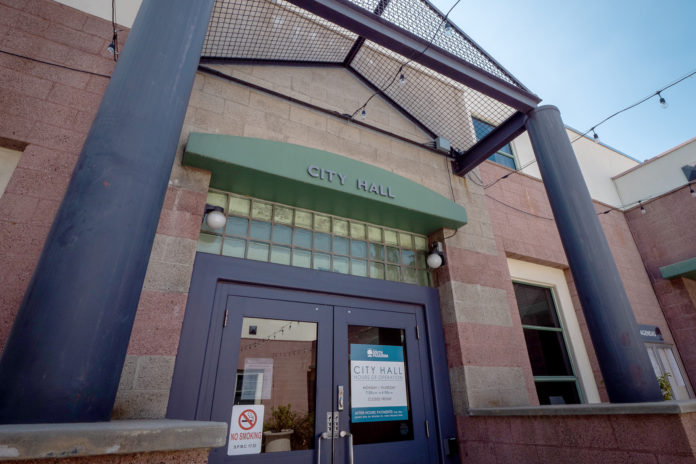
Five members of the community were named at the South Pasadena City Council’s Oct. 7 meeting to serve on the newly created Finance Ad Hoc Committee (FAHC) aimed at facilitating the city’s work to reform and rectify its well-documented financial management problems.
Although the committee’s charge has been refined to “enhanc(ing) communication with the public regarding the status” of the city’s financial documents and budget, it won’t be subject to the public access and notice requirements of the Brown Act. It was still unclear Tuesday whether the committee’s first meeting had even been scheduled.
The community members will be Peter Giulioni, Jr. a former partner at Deloitte Consulting and assistant dean at the USC Marshall School of Business; attorney Edward Corey, a former Tournament of Roses executive and Finance Commission member; Charles Li, a corporate finance analyst; Gregory Chun the founder of Greco Technologies; and William Cullinane, Jr, an experienced buyer and seller of businesses and Oneonta Club leader. Copies of the candidates’ applications can be found here. They will join the previously designated city council and finance commission members: Mayor and District 1 Councilmember Robert Joe, District 2 Councilmember Stephen Rossi; Finance Commission Chair Fred Findley; and Commissioner Ed Elsner.
At the recommendation of District 4 Councilmember Mike Cacciotti, the Council opted to appoint five candidates to the FAHC instead of “up to three,” as recommended by city staff and the Finance Commission. Cacciotti said he was impressed by the caliber of the nine citizens who applied for the job — “an abundance of talent” — and said while a larger group could make it “bulky,” having that much more talent would “add to the chemistry” and to what the FAHC can accomplish.
District 3 Councilmember Richard Schneider moved to put Corey and Cullinane on the committee.
District 5 Councilmember Diana Mahmud was wary of the expansion. The assertion being; the larger it is, the harder it is schedule meetings, especially as the committee is aimed at working quickly to enable adoption of the overdue 2020-21 city budget and wrap up before more citizens cast votes on the Utility Users Tax. Mayor Joe agreed more than three community members could be “unwieldy.”
Interim Assistant City Manager Elaine Aguilar was also concerned about the ability of all members being able to make every meeting and said it was difficult to assess how much work the committee will create for staff with additional members.
But District 2 Council Member Stephen Rossi, who proposed the FAHC, said it was not critical that every member make every meeting as the committee is a task force and not an oversight board. He said as long as Chun was among appointees, he was not opposed to expansion. Chun is the “only applicant who actually has true financial restructuring experience throughout his career, which is something I think is sorely needed.”
Mahmud said since municipal accounting is said to be “significantly different” from private accounting, the Council should appoint Charles Li, who’s spent the last year as finance analyst at the Port of Los Angeles and served in 2015 on the South Pasadena renewable energy committee. His background might be “more relevant than someone who has restructuring experience” especially, she said, as the city’s financial difficulties stem principally from the failure to move money into the appropriate accounts.
Li would make a great Finance Commission candidate, Rossi replied, “but what we’re looking for here is a task force of [chief]-level type, long-term career execs who know how to come in and actually turn things around and change a cultural and organization.”
Nevertheless, Li was among those appointed.
The FAHC had its first meeting Oct. 13. It got a report on the 2018-19 audit findings and the draft 2019 Comprehensive Annual Financial Report (CAFR). At a special meeting Oct. 15, the Finance Commission got a report on questions it raised about CAFR and ultimately voted to recommend the City Council approve it.
Staff went over the documents, explaining several revenue and expenditure discrepancies between the CAFR and the 2018-19 budget. Interim Assistant City Manager Elaine Aguilar said these included Excel spreadsheet formula errors and figures that didn’t make it into the city’s finance system.
There were also some missing figures in the audit — funds that should have been set aside in the general fund reserve for Council-approved projects. Staff identified two dozen variances requiring changes to the CAFR totaling about $1.5 million.
Despite the adjustments, “the overall gist of the audit hasn’t change.” Aguilar said the FAHC sought more information on the severity of the audit findings, especially on budget and purchasing policies, to assess the reliability of the data. She said additional information was provided and “was not significant enough to put the whole document” into question.
Staff is preparing a recommendation to the City Council for additional resources, though Aguilar was not prepared to estimate the cost. At least one new person is needed, though two would “optimal.” They will need to be experienced municipal finance folk and she has already begun interviews, though it is undecided whether the help will be from new employees, contractors, or temporary retired government employees such as herself. There is an immediate need for help getting caught up on delayed budget and audit work, as well as for permanent help, but the extent of latter won’t be discernable until more of the catch-up work complete.
Another Finance Commission meeting is set for Oct. 22.















.png)






